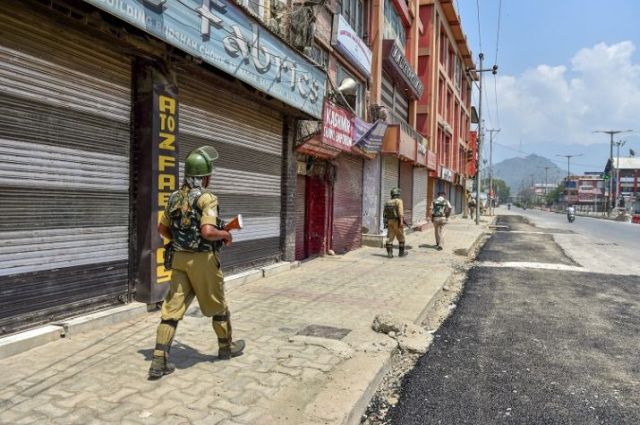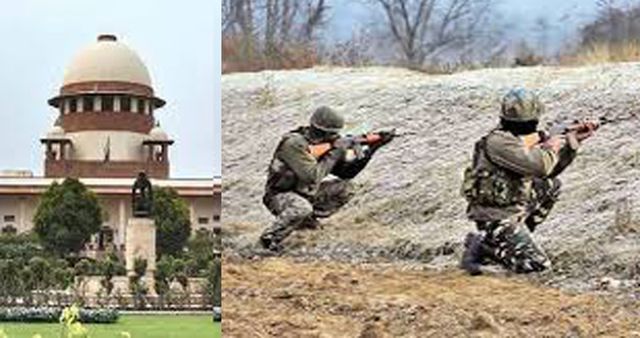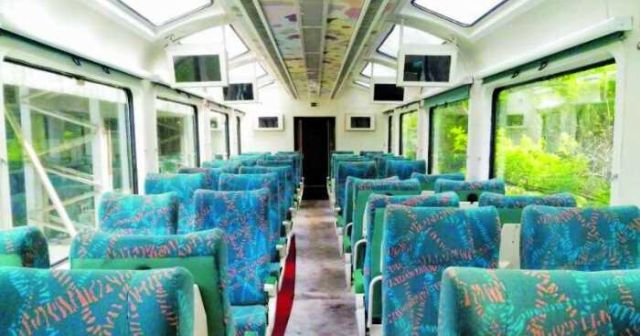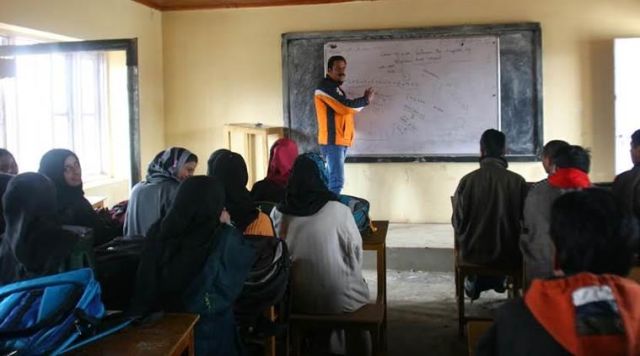
by admin | May 25, 2021 | News, Politics
 Sringar : Authorities on Monday imposed a shutdown on Srinagar and some other parts of the Kashmir Valley following rumours that the Supreme Court has scrapped Article 35A, police said.
Sringar : Authorities on Monday imposed a shutdown on Srinagar and some other parts of the Kashmir Valley following rumours that the Supreme Court has scrapped Article 35A, police said.
Jammu and Kashmir Police issued a statement here, saying: “Some sections of the media have circulated news regarding scrapping of the Article 35A. The news has been refuted as baseless. People are requested to maintain calm and not to pay heed to these rumours.”
As a precaution, shops, public transport and other businesses were shut.
Clashes between stone pelting protesters and the security forces were also reported in Anantnag district and other places.
Petitions challenging Article 35A which gives powers to the state legislature to define permanent residents of Jammu and Kashmir and their privileges, has been listed for hearing by the Supreme Court on Friday.
Reports from Delhi said a fresh petition seeking scrapping of the Article is being filed in the apex court on Monday which fuelled the rumours.
Governor Satya Pal Malik has engaged Additional Solicitor General Tushar Mehra to defend the Article.
Authorities have decreased the speed of mobile internet across the Valley.
Separtists have called for a general shutdown on Friday and Saturday to highlight the public support for the Article.
—IANS

by admin | May 25, 2021 | News, Politics
 New Delhi : The Supreme Court will hear on September 4 a plea by a group of serving Army officers against the dilution of AFSPA that gives immunity to military personnel from prosecution for their actions in disturbed and insurgency-hit areas.
New Delhi : The Supreme Court will hear on September 4 a plea by a group of serving Army officers against the dilution of AFSPA that gives immunity to military personnel from prosecution for their actions in disturbed and insurgency-hit areas.
A bench of Justice Madan B. Lokur and Justice Uday Umesh Lalit will hear the matter. The bench is already hearing a plea by kin of victims of alleged fake shootouts or extra-judicial executions in Manipur by state police and the armed forces.
A bench of Justice Madan B. Lokur, Justice S. Abdul Nazeer and Justice Deepak Gupta listed the matter for hearing by the two-judge bench on September 4.
The petition is essentially rooted in the top court’s order on alleged extra-judicial killings in Manipur.
The petitioners have sought specific guidelines to protect military personnel from criminal proceedings for bona-fide actions done in the discharge of official duties in areas infested with insurgents and witnessing proxy wars against India.
The petitioners range from Section Commanders to Commanding Officers who lead section, platoon, company, battalion made of 10 to 1,000 men each.
They have contended that the protection provided by the Armed Forces Special Powers Act (AFSPA) does not confer any special right on a soldier for himself, but facilitates his functioning and operations in extraordinary circumstances of proxy war, insurgency, armed hostility, ambushes, and covert and overt operations.
Drawing a distinction between routine policing and military operations in disturbed areas, they contended that absolute protection for bona-fide actions of soldiers in extraordinary situations is imperative to enable them to carry out their duties effectively and efficiently.
This protection from criminal prosecution for bona-fide actions of a soldier in the course of military operations in disturbed areas, the petition says, is sine qua non for the protection of the country’s sovereignty and integrity.
The officers have sought a court direction that “protection of persons acting in good faith under the AFSPA is sacrosanct with the sovereignty and integrity of the nation” and that “no prosecution, suit or other legal proceeding shall be instituted, except with the previous sanction of the Central government….”
They further averred that it was the Army alone which is familiar with the dynamics of these operations, and was capable of probing allegations of criminality, misuse, abuse, or of excessive use of power by men in uniform.
“Civil police or even the Central Bureau of Investigation can’t even be expected to be in the know of complete picture,” they claimed.
The petition by Colonel Amit Kumar and others is rooted in the persecution and prosecution of military personnel for carrying out their bona-fide duties in disturbed areas of the northeast, particularly in Manipur and trouble-torn Jammu and Kashmir, and directing registration of cases.
The military personnel, the petitioner officers contended, were being targeted without making any distinction or determination whether their actions were in good faith and without any criminal intent.
—IANS

by admin | May 25, 2021 | Corporate, Corporate Governance, Economy, News, Politics
 By Arun Kumar Das,
By Arun Kumar Das,
New Delhi : Awaiting the return of normalcy — as well as tourists — in the Kashmir Valley, an indigenously-built vistadome (glass-top) railway coach, though ready to run, has been docked at Badgam station for months.
The 40-seater vistadome coach was announced in June last year by then Railway Minister Suresh Prabhu and was manufactured by the Integral Coach Factory in Chennai at an estimated cost of abut Rs 4 crore.
The see-through air-conditioned coach with large glass windows, glass roof, observation lounge and rotatable seats, a first such service in the state, aims to facilitate passengers to experience the breathtakingly beautiful locations and sites en route the 135 km from Banihal to Baramulla.
Keeping tourists in mind the seats are attached with trays similar to those in airplanes for eating and passengers can order light meals to be made available during the journey.
The vistadome coach travelled all the way and was delivered at Badgam this April. It was expected to be made operational in May, allowing visitors to Kashmir to get a delightful view of the picturesque landscape of the Valley.
“The prevailing situation is not right now to press vistadome coach into service. It will be operational once the conditions improve,” a senior Railway Ministry official told IANS, not wishing to be identified.
The specially-designed vistadome coach also has double-wide reclining seats which can be rotated 360 degrees for a panoramic view of the surroundings. It also has glass-domed ceilings, automatic sliding doors, luggage racks, multiple LED screens for entertainment and a GPS-enabled information system.
A step towards boosting tourism, the vistadome coach was first introduced for Araku valley in Vishakapatnam-Kirandul passenger train in April last year, offering a panoramic view of the hills, valleys and an exhilarating experience to tourists as it passes through tunnels.
The second vistadome coach was attached to the Jan Shatabdi between Dadar and Madgaon, on Mumbai-Goa route, in September last year.
(Arun Kumar Das can be contacted at akdas2005@gmail.com)
—IANS

by admin | May 25, 2021 | Opinions
 By Admiral Arun Prakash (Retd),
By Admiral Arun Prakash (Retd),
Independent India and I are both septuagenarians, but since I am a trifle older, I take the liberty of indulging in some reminiscences on the nation’s 71st birthday. My recollections are focused on Kashmir where I was born, in a town called Anantnag.
I particularly remember the traumatic night of October 30, 1947 when India was 10 weeks old and I had just turned three. In my mother’s arms I, with two elder siblings, hid under bushes in our garden as bullets ricocheted off our cottage roof. We lived in Badgam village, 30 km from Srinagar airport. The fusillade was coming from surrounding hills, occupied by Pakistani kabailis (tribals), en route from Uri and Baramulla, hoping to capture Srinagar airport.
At dawn, we piled into the family horse-drawn tonga, with just the clothes on our back and fled to the airport, where RIAF DC-3 Dakotas were disembarking Indian troops. We clambered into a departing aircraft, which flew us to Delhi, and refuge, with relatives.
Growing up in lovely little towns of the Valley in post-independence decades was idyllic and I reluctantly parted from my parents in Leh in 1959, to join college and the Indian Navy. In Jammu and Kashmir, my playmates were all Kashmiris — of Muslim, Hindu and Sikh faith. Our parents were friends; we ate in each others’ homes and celebrated festivals together. But even as children, we understood that Kashmir was not (yet) India, and that the average Kashmiri’s attitude towards India was ambivalent.
India provided huge financial assistance to Jammu and Kashmir: Food, education, clothing and medicine were either free or heavily subsidised. Kashmiris would accept the largesse, but tune in every evening to Radio Pakistan which invariably played on their religious heart-strings, spouting propaganda about “occupation” of Kashmir and “atrocities” by the Bharatiya fauj (Indian Army).
Kashmir’s first ‘Prime Minister’ (he was called Wazir-e-Azam) Sheikh Abdullah was the state’s tallest figure then; a friend of Nehru’s and a staunch secularist, he was the self-styled Sher-e-Kashmir (Lion of Kashmir). In 1953 we were startled to hear that he had allegedly conspired with the Americans to become “King Abdullah” of an independent Kashmir. He was arrested and the Valley burst into flames.
I recall seeing my father, then Magistrate of Baramulla, coming home, bleeding from the head; there had been stone-pelting in the old town, as agitators waved Pakistani flags and shouted pro-Pakistan slogans.
While the 1950s and 60s may not have witnessed wild enthusiasm for India, there was neither hostility nor bitterness amongst Kashmiris.
However, an utterly unimaginative New Delhi had little to offer them, apart from money. As much as 95 per cent of the millions that India poured into Jammu and Kashmir never reached the impoverished Kashmiri. In the absence of a politico-economic strategy for creating jobs, industry or infrastructure, Indian money merely enriched Kashmiri politicians and aggravated popular resentment and alienation, which Pakistan exploited.
India’s maladroitness did not end here. A succession of Pakistani-orchestrated incidents, between 1963 and 1999, demonstrated the ineptness of our intelligence agencies, lack of civil-military coordination and the complete strategic bankruptcy of New Delhi. This depressing sequence included the theft of Prophet Mohammad’s sacred relic, seizure of Hazaratbal shrine, capture and burning of the Charar-e-Sharif shrine, expulsion of Kashmiri Pandits from the Valley, the Kargil War and hijacking of IC-814.
This reminiscence is not a history of Kashmir’s travails, but merely a reminder to those who profess shock at recent developments in the Valley that the Indian state has, since 1947, learnt nothing from history, repeated its mistakes and failed to convince Kashmiris that they are Indian.
The French have a cynical aphorism: “the more things change, the more they remain the same”. This Independence Day, let us introspect if this is true of India’s management of Kashmir.
(The author is a former chief of the Indian Navy and Chairman, Joint Chiefs of Staff. The article is in special arrangement with South Asia Monitor.)
—IANS

by admin | May 25, 2021 | Entrepreneurship, News, Social Entrepreneur, Success Stories
 By Sheikh Qayoom,
By Sheikh Qayoom,
Srinagar : Rajnath, 72, a retired school headmaster, continues to live in his ancestral home in north Kashmir’s Manigam village. The turmoil of the 1990s saw most members of his minority Kashmiri Pandit community leave the village, but Rajnath stayed back in the village he was born in, with his wife and daughter.
Rajnath, a Hindu, has tremendous faith in the goodwill of his Muslim neighbours, most of whose present generation in the village have been his students. Local Muslims helped Rajnath’s daughter get a teacher’s job in a private school. They have been the biggest support not only for Rajnath, but also for over 3,000 Kashmiri Pandits who continue to live among their Muslim neighbours in the Valley — much against the established narrative that all Pandits had fled because of persecution in the Muslim-dominated region.
Only two months back, local Muslims not only carried the body of an elderly local Pandit to the cremation ground in Srinagar city, but also ensured that all Hindu rites for the departed were performed in accordance with the customs of the family. Womenfolk in the neighbourhood mourned the death like one of their own. Muslim neighbours arranged food and other requirements for the bereaved family since no Pandit household cooks food during the mourning period.
Rajnath is sad for those fellow local Pandits who left their homes and lands behind while migrating out of the Valley during the turbulent 1990s. He also harbours a strong grouse against the government.
While his daughter teaches at a private school, the wages are too meagre to support her family. She has a four-year old daughter and a husband working as a wireless operator in the police telecommunication wing. She has a masters degree in sociology and for five years she has been running from pillar to post for a government job, but to no avail.
“Her husband has now started pressing my daughter to seek a job outside the Valley and, if that happens, I and my wife would be left behind,” the father said with moist eyes.
“While ordering relief packages and employment offers to the migrant Pandits for their return to the Valley, the government has completely ignored those members of our community who chose to stay back,” he said.
Unfortunately, the story of traditional amity and brotherhood between different communities in the Valley are lost in the negative narratives of violence and hatred that Kashmir has faced in the last three decades.
An ancient temple site in Sumbal area of Bandipora district was last year cleaned and spruced up for Pandit pilgrims by local Muslims. The holiest Hindu temple shrine of Mata Kheer Bhawani in Tulamulla village of north Kashmir’s Ganderbal district continues to receive thousands of devotee Pandit pilgrims each year on the annual festival. The festival is held towards the end of the spring season.
Despite migration, thousands of Kashmiri Pandits continue to come to pray at the Mata’s shrine in Tulamulla and the centuries-old tradition of local Muslims bearing earthen pots filled with milk to receive the pilgrims has not been affected by the winds of violence sweeping the Valley.
One of the holiest places for immersion of ashes for the local Pandits is the Gangabal lake situated at the foothills of the Harmukh peak in the Kashmir Himalayas. After remaining suspended for some years, Kashmiri Pandits have resumed the tradition in the last four years.
Local Muslims have historically worked as guides and load carriers for the Pandit families during the uphill trek to this mountain lake. Even today, local Muslims continue to discharge this duty for the Pandit devotees visiting the lake.
“I have never felt any difference in the warmth and affection the local Muslims have shown towards our family since my childhood when I visited the Kheer Bhawani temple with my parents.
“After my family migrated to Jammu. I have been visiting the temple shrine each year since 1990. Local Muslims have the same warmth and affection when I visit the shrine now as a middle aged devotee,” Ashok Koul, 56, a bank employee, told IANS.
While attacks by misguided militants get front-page coverage in newspapers and as breaking news on TV, the aspect of Kashmir showing the communal harmony and brotherhood among ordinary Muslims and Hindu Pandits gets scant attention. Good news, alas, doesn’t make news any more for the sensation-seeking media of today.
(The weekly feature series is part of a positive-journalism project of IANS and the Frank Islam Foundation. Sheikh Qayoom can be contacted at sheikhqayoom@gmail.com)
—IANS

 Sringar : Authorities on Monday imposed a shutdown on Srinagar and some other parts of the Kashmir Valley following rumours that the Supreme Court has scrapped Article 35A, police said.
Sringar : Authorities on Monday imposed a shutdown on Srinagar and some other parts of the Kashmir Valley following rumours that the Supreme Court has scrapped Article 35A, police said.



